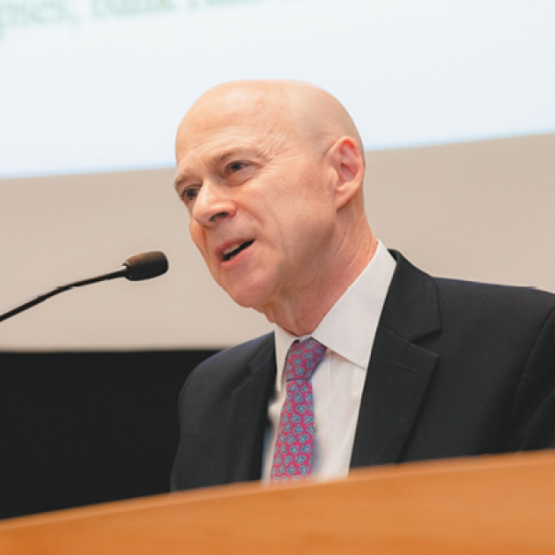Foreign Language Centre's role in supporting students' competences for lifelong learning
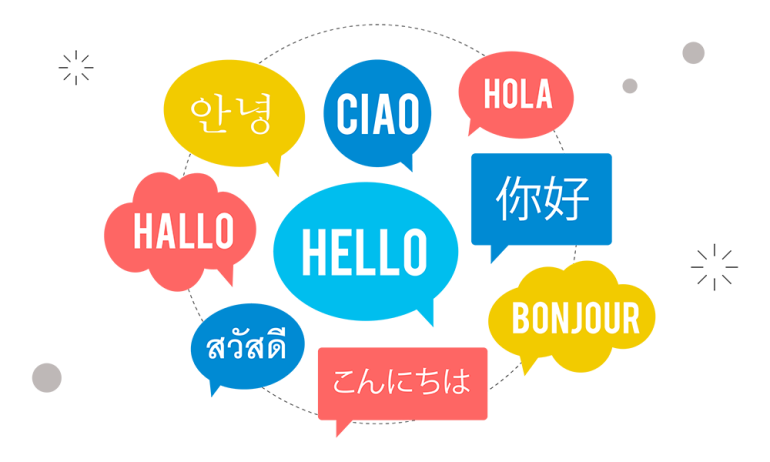
On 3 December 2024, the Foreign Language Centre team – Dr. Izabela Godlewska, Dr. Renata Nowicka, and Dr. Renata Jagaczewska participated in the Seminar Challenges of Language Education at Universities. The event was organised by the Polish Rectors Foundation in cooperation with its strategic partner, Pearson Central Europe, and took place at the headquarters of the Polish Rectors Foundation in Warsaw. The seminar focused on introducing trends and challenges related to foreign language teaching at universities from the perspective of both universities and Pearson. The seminar was attended by representatives of academia, educational activists and lecturers from Foreign Language Centres across many Polish cities.
As part of Session I, moderated by doctor Ewa Chmielecka, Leader of the FRP-Pearson Project, entitled Current challenges of language education at universities, a lecture entitled Policy and practices of language education in higher education was delivered by Jolanta Urbanik, an expert on the internationalisation of education. The lecture highlighted the importance of the European multilingualism policy in the context of the EU Council Recommendations on Key Competences for Lifelong Learning and a Comprehensive Approach to Language Teaching and Learning. The Recommendation of the Committee of Ministers of the Council of Europe on multilingual and intercultural education for democratic culture was also mentioned.
The next lecture, on the latest trends and solutions in language education in the era of artificial intelligence (AI), was given by Bartłomiej Janiak from Pearson. The speaker emphasised the inevitable integration of software with artificial intelligence as well as a departure from universal AI models in favour of personalised ones, tailored to a specific industry or user, which increases their practical application. However, while there is no doubt that artificial intelligence has brought about a true revolution in language learning and teaching, for example, by monitoring progress in real time, supporting pronunciation learning based on authentic materials and creating immersive learning environments (VR, AR), traditional methods still offer many benefits that this technology cannot replace. In the context of the advantages of traditional learning and teaching, it is certainly important to emphasise the significance of planning the process of learning a foreign language by professional teaching staff, considering the development of key linguistic and social competences and familiarizing learners with intercultural differences. As is widely known, factors such as interpersonal relationships, emotions, body language and sensitivity, among others, also play an important role in the traditional process of learning foreign languages, while artificial intelligence – although it can certainly stimulate certain elements of communication – is not able to fully reflect them.
As part of Session I, the Foreign Language Centre team delivered a presentation entitled The Role of the Foreign Language Centre in Supporting Students’ Competences for Lifelong Learning. The presentation was divided into three parts. The first part focused on the Foreign Language Centre teaching offer as a unique added value for the university’s academic community. It was emphasised that this offer is exceptionally diverse, and SGH has long been recognised for its very high standards in foreign language teaching. The Foreign Language Centre has been consistently committed to maintaining the highest quality of teaching for decades. As a result, SGH graduates are highly sought-after candidates in the labour market. They are able to communicate effortlessly in foreign languages, participate in exchange programmes and international internships, and possess the social and intercultural competences necessary to thrive in 21st-century society.
The second part of the presentation introduced the concept of key competences. Notably, recent literature highlights a variety of terms synonymous with key competences, such as future skills, transitive competences, and soft skills. It is essential to mention Daniel Goleman’s classic concept of “emotional intelligence,” which emphasises that, beyond specialised knowledge, emotional intelligence plays a crucial role in achieving excellence at work. Emotional intelligence encompasses personal skills (such as self-awareness, self-regulation, and motivation) and social skills (including empathy, influencing others, understanding, conflict resolution, leadership, driving change, building relationships, cooperation, and teamwork). A clear parallel can be drawn between these essential skills and those outlined in one of the latest editions of the World Economic Forum’s report - The Future of Jobs 2023. These competences align closely with those that should be cultivated in students, as highlighted by Habilitated Doctor Jakub Brdulak, Professor at the SGH Warsaw School of Economics, including
- creative and critical thinkers,
- problem solvers,
- active citizens,
- responsible citizens,
- lifelong learning1.
Referring to the support for the development of competences of the future, which for the purposes of the article and didactics applied at the Foreign Language Centre were called personal, social and learning competences, the presentation highlighted how they are implemented in practice. In class, students learn to use a wide range of persuasive and rhetorical techniques to influence their audience. As a result, they develop skills relevant to future managers, marketers, HR specialists, and others. Students analyse ways of constructing a presentation, dividing it into appropriate parts and emphasizing key content elements in a way that makes them easier to remember. They also share mnemonic techniques with the group to support the memorisation process, as well as tools to help manage time, increase productivity, plan and achieve goals. Examples of such tools are: Eat the Frog, the Pomodoro technique, The Golden Hour (Optimal Work), Design Thinking, and the Eisenhower matrix. They learn from the masters of speaking, modeling themselves on the video materials made available to them in class, using anecdotes and storytelling in their speeches, and grouping the content according to the dream framework or disaster framework.
In language classes, teamwork (in pairs and micro-groups) is additionally practiced. For instance, during group projects or case studies, such as designing a logo, branding, and marketing strategy for a specific company, we integrate students’ professional experiences with syllabus content, simultaneously enhancing their practical collaboration skills. Students exchange ideas and experiences, which supports the process of lifelong learning.
The paradox of our times lies in the fact that increasing technologisation, including the tools used in the teaching process, makes the teacher’s work easier to an unprecedented degree while simultaneously requiring significant time to master these tools. One could echo a statement from the pandemic era and the global shift to remote teaching: technology, in addition to the subject being taught, has become our second profession as teachers—one in which we are constantly improving our skills.
The rise of AI presents vast opportunities in education, particularly in language learning for business and economics. At the Foreign Language Centre, AI has proven valuable for generating lexical tasks, assisting with reports, and summarising texts. It also supports skill development for SGH graduates by simulating business meetings, providing stakeholder perspectives, and enhancing communication strategies. However, despite AI’s transformative role, professional educators remain irreplaceable. Effective AI use requires careful oversight and verification by skilled teaching staff, who must continuously refine their expertise. AI is a powerful tool, but its success in education depends on responsible and informed application.
It should therefore be noted that, despite the proliferation of IT, electronic, and artificial intelligence tools—or perhaps even more so—the so-called human, soft factor plays a fundamental role in situations SGH graduates often encounter, such as negotiations, closing sales transactions, or simply establishing contact. Ultimately, persuading an interlocutor or selling a product or service, is achieved through soft skills, emotions, and the charisma of the speaker/seller/marketer, etc. It is thus crucial to emphasise that language classes, inherently focused on communication, have significant potential to enhance skills among students. These skills are essential not only for the professional lives of graduates from an economic and social university but also for individuals navigating modern life in general.
Language classes show that the student is not only a recipient of knowledge but also its co-creator, initiator and catalyst, thanks to the use of various applications and IT tools by students in the process supporting didactics, integration of various experiences, sources of knowledge, communication techniques.
We also note that our classes allow students to express themselves creatively drawing knowledge not only from economic textbooks but from various cultural texts. This approach enables students to benefit from the global intellectual heritage and increase their competences important for personal and professional development. It is worth mentioning a few book titles that students have referred to on various occasions during language classes as sources of knowledge and models they draw upon, and where the socio-economic profile of the university is present:
- Jeff Bezos, The Regret Minimisation Framework – how to make big decisions;
- Nassim Taleb, The Black Swan – on the human ability to explain intricate and unpredictable events to oneself;
- Jeff Olson, The Slight Edge – how to turn simple daily routines into life success;
- Klaus Schwab, The Fourth Industrial Revolution – how to navigate the 4.0 revolution, where the physical and digital worlds merge;
- Daniel Kahneman, Thinking, Fast and Slow – about happiness, satisfaction with a life in which pain is combined with pleasure, and optimisation of the decision-making process, especially in conditions of uncertainty;
- Benjamin Graham, The Intelligent Investor (with an introduction by Warren Buffett) – a guide to risk management and investment strategies.
The presentation attempts to formulate the thesis that, thanks to language classes, SGH students become citizens of the world who are sensitive to contemporary ethical issues. The topics discussed include the ethics of supply chains, areas of poverty, modern exclusion, sustainable development, and neurodiversity. The discussions on these topics (in connection with various language exercises) help students formulate and express their opinions in relation to the issues of the modern world. These activities inevitably allow participants of the teaching process to integrate experiences – personal, academic, organisational, among others - through participation in clubs and organisations within SGH and beyond.
Our presentation at the Polish Rectors Foundation highlighted how language classes at the Foreign Language Centre provide a universal and holistic education. By integrating exact sciences with the humanities, students develop both hard and soft skills essential for an economic and social university. Tailored instruction, syllabus alignment with the university profile, and a strong focus on communication help students express themselves and expand their horizons. As Ludwig Wittgenstein said, “The limits of my language are the limits of my world.” This approach gives graduates a competitive edge, blending academic knowledge, professional experience and organisational skills for career success.
The third part of the presentation was devoted to the role of the Foreign Language Centre as a potential partner for external and business environments. Recognising the need to develop the aforementioned personal, social, and foreign language learning competences also outside the language courses, the Foreign Language Centre has developed a plan of possible directions of growth. This plan includes a range of initiatives aimed at supporting students in building intercultural competences and gaining practical experience in an international business environment while simultaneously improving their language skills.
A key element of this strategy is the cooperation of the Foreign Language Centre with international external institutions, such as chambers of commerce or diplomatic missions to organise meetings between their representatives and SGH students. These meetings can provide students with an excellent opportunity to learn about the practical aspects of international business operations and to gain valuable experience in foreign language communication. Students participating in such meetings will have the chance to expand their knowledge of business trends, understand the current challenges faced by international enterprises, explore opportunities for international collaboration and gain a better understanding of intercultural differences in business and diplomacy. At the same time, they will develop practical language skills in a business context.
Another initiative in the Foreign Language Centre development strategy involves encouraging students to participate in events and workshops organised by external institutions. One example includes debates and simulations hosted by the European Parliament. During such events, students, using a chosen foreign language, take on the roles of Members of the European Parliament, negotiate and decide whether to pass or reject specific EU directives.
In addition, the Foreign Language Centre development plan includes workshops conducted in foreign languages to support the development of soft skills. These workshops are an initiative that combines learning and improving a foreign language with the development of key skills needed in professional and personal life. The workshops will cover issues such as interpersonal communication, time management, relationship building, conflict resolution and teamwork skills, among others.
Session II of the seminar featured a discussion panel on the necessity of increasing the language exam requirements for graduation at Level 8 of the Polish Qualifications Framework. The session was moderated by Lucyna Skwarko, President of the SERMO Association and Director of the Foreign Language Centre at the Warsaw University of Technology. Currently, a doctorate may be awarded to a person with foreign language proficiency at a minimum of B2 level. However, many academics believe that this standard should be raised to C1.
During Session III, panelists sought to answer the question whether the list of certificates verifying foreign language proficiency should be regulated by a Ministry of Science and Higher Education directive or left to the discretion of individual universities. The panel was moderated by Dr. Sylwia Kossakowska-Pisarek, while Anna Kowalczyk, Sales Director, Pearson, introduced participants to Pearson’s latest language exams.
The seminar’s theme perfectly aligns with expectations regarding language education at universities and its role in the era of rapid technological advancements, including the development of artificial intelligence. The event provided an opportunity to gain valuable insights, establish connections, and participate in discussions about the future of language education.
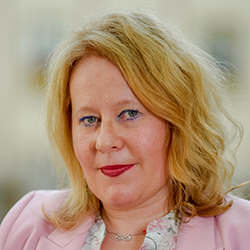
Doctor IZABELA GODLEWSKA, the Foreign Language Centre, English Language Department, SGH
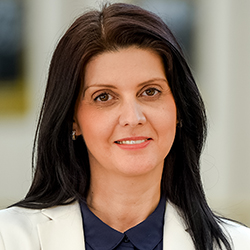
Doctor RENATA JAGACZEWSKA, the Foreign Language Centre, German Language Department, SGH
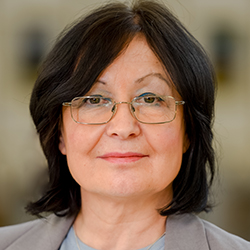
Doctor RENATA NOWICKA, the Foreign Language Centre, English Language Department, SGH

